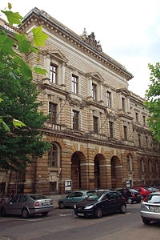
Felix Mendelssohn College of Music and Theatre
Encyclopedia
The University of Music and Theatre "Felix Mendelssohn Bartholdy" Leipzig is a public university
in Leipzig
(Saxony
, Germany
). Founded in 1843 by Felix Mendelssohn
as the Conservatory of Music, it is the oldest university school of music
in Germany.
The institution includes the traditional Church Music Institute founded in 1919 by Karl Straube
(1873–1950). The music school was renamed ″Felix Mendelssohn Bartholdy″ after its founder in 1972. In the year 1992 the Hans Otto Drama School of Leipzig, Germany's oldest drama school
, became part of the college.
Since the beginning there was a tight relationship between apprenticeship and practical experience with the Gewandhaus
and the Oper Leipzig
, as well as theaters in Chemnitz
(Städtische Theater Chemnitz), Dresden
(Staatsschauspiel Dresden
), Halle
(Neues Theater Halle), Leipzig
(Schauspiel Leipzig) and Weimar
(Deutsches Nationaltheater in Weimar).
The university of music and theater is one of 365 places chosen in 2009 by the Cabinet of Germany
and the Office of the Representative of German Industry and Trade for the campaign Germany - Land of Ideas.
, founded a Conservatory in the city of Leipzig on April 2, 1843. He was sponsored by a high civil servant of the Kingdom of Saxony
, the Oberhofgerichtsrat Heinrich Blümner (1765–1839), who provided King Frederick Augustus II of Saxony
with 20,000 Thaler
.
The music school's home was in the first Gewandhaus
(in the Gewandgäßchen/Universitätsstraße street at the city center, today the city's department store is based there). The musicians of the Orchestra were obligated to act as teaching staff, a tradition that was unbroken until German reunification
in 1990.
In 1876 the school got permission to change its name to Königliches Konservatorium der Musik zu Leipzig, Royal Conservatory of Music of Leipzig. The new premises at Grassistraße 8 were inaugurated on December 5, 1887. They were built 1885-1887 by the architect
Hugo Licht (1841–1923) in the music quarter of Leipzig, south-west of the city center. The benefactor was the pathologist Justus Radius (1797–1884).
Not until 1924 was the Royal Conservatory renamed into Landeskonservatorium der Musik zu Leipzig, six years after the fall of the Kingdom of Saxony.
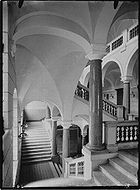 In the summer term of 1938 343 male students were enrolled at the Landeskonservatorium. This made the Conservatory the fourth biggest music school in the German Reich after the Universität der Künste Berlin
In the summer term of 1938 343 male students were enrolled at the Landeskonservatorium. This made the Conservatory the fourth biggest music school in the German Reich after the Universität der Künste Berlin
(633 students), the music school of Cologne
(406 students) and the school for music and theater of Munich
(404 students).
The Austrian composer Johann Nepomuk David (1895–1977) was the school's director from 1939 until 1945.
The school was again renamed Jun 8 1941 to Staatliche Hochschule für Musik, Musikerziehung und darstellende Kunst, Public College for music, musical education and performing arts. In 1944 the school remained closed due to the Second World War.
Once again, the school was renamed October 1, 1946 to Mendelssohn Academy and November 4, 1972, on the occasion of its founders name, to Hochschule für Musik Felix Mendelssohn Bartholdy, Felix Mendelssohn Bartholdy College of Music.
The Saxon University Constitution Law (Sächsische Hochschulstrukturgesetz) of April 10, 1992 confirmed the College of Music to Leipzig and expanded it with the annexation of the Hans Otto College of Theatre (Germany's first College of Theatre) to form the Hochschule für Musik und Theater Felix Mendelssohn Bartholdy : the Felix Mendelssohn Bartholdy College of Music and Theatre.
The new Great Hall was inaugurated 2001 and 2004 awarded by the Bund Deutscher Architekten, a German architects union. The college's second premises were opened 2002 and there's an orchestra academy in co-operation with the Gewandhausorchestra since 2004 in order to support top musicians.
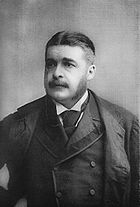
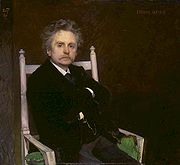
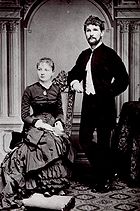
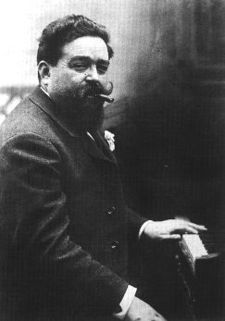
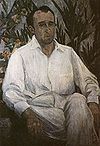

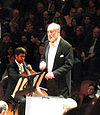 This is an assortment of notable alumni: (See also :Category:Felix Mendelssohn College of Music and Theatre alumni)
This is an assortment of notable alumni: (See also :Category:Felix Mendelssohn College of Music and Theatre alumni)
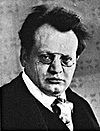
(1873–1916), Kurt Thomas
(1904–1973) and Günther Ramin
(1898–1956). It offers programs in church music, chorus conduction and organ
. It offers research masters in those subjects as well.
The Institute of Church Music was founded by Karl Straube
(1873–1950) in 1921 and 1926 it became part of the Saxon Evangelical-Lutheran Church.
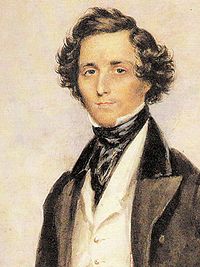
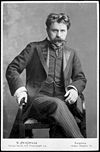 Rector
Rector
s of the university:
. As of 2008 the adjustment to the Bachelor's degree
and Master's degree
system is being organized. The education program with major in school music is since the winter term of 2006/07 already adapted to the Bologna process and as such leads to a Bachelor's degree. The programs of the Institute of Church Music were changed to the beginning of the winter term 2008/09 and until the winter term of 1010/2011 all programs have to be adapted to the Bologna process.
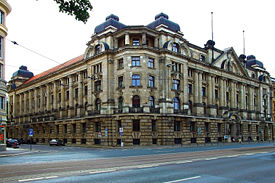
, Russia
, South Korea
and China
. Thirteen of them are scholarship holders of the German Academic Exchange Service
, this makes the school the best one on the scholarship holders list out of every German Music Colleges.
and the recognized Young Concert Artists European Auditions together with the Young Concert Artists
(YCA), New York
.
The school leads among all German colleges of music with a total of 470 public events yearly.
Public university
A public university is a university that is predominantly funded by public means through a national or subnational government, as opposed to private universities. A national university may or may not be considered a public university, depending on regions...
in Leipzig
Leipzig
Leipzig Leipzig has always been a trade city, situated during the time of the Holy Roman Empire at the intersection of the Via Regia and Via Imperii, two important trade routes. At one time, Leipzig was one of the major European centres of learning and culture in fields such as music and publishing...
(Saxony
Saxony
The Free State of Saxony is a landlocked state of Germany, contingent with Brandenburg, Saxony Anhalt, Thuringia, Bavaria, the Czech Republic and Poland. It is the tenth-largest German state in area, with of Germany's sixteen states....
, Germany
Germany
Germany , officially the Federal Republic of Germany , is a federal parliamentary republic in Europe. The country consists of 16 states while the capital and largest city is Berlin. Germany covers an area of 357,021 km2 and has a largely temperate seasonal climate...
). Founded in 1843 by Felix Mendelssohn
Felix Mendelssohn
Jakob Ludwig Felix Mendelssohn Barthóldy , use the form 'Mendelssohn' and not 'Mendelssohn Bartholdy'. The Grove Dictionary of Music and Musicians gives ' Felix Mendelssohn' as the entry, with 'Mendelssohn' used in the body text...
as the Conservatory of Music, it is the oldest university school of music
Music school
The term music school refers to an educational institution specialized in the study, training and research of music.Different terms refer to this concept such as school of music, music academy, music faculty, college of music, music department or conservatory.Music instruction can be provided...
in Germany.
The institution includes the traditional Church Music Institute founded in 1919 by Karl Straube
Karl Straube
Montgomery Rufus Karl/Carl Siegfried Straube was a German church musician , organist, and choral conductor, famous above all for championing the abundant organ music of Max Reger. He studied organ under Heinrich Reimann in Berlin from 1894 to 1897 and became a widely respected concert organist...
(1873–1950). The music school was renamed ″Felix Mendelssohn Bartholdy″ after its founder in 1972. In the year 1992 the Hans Otto Drama School of Leipzig, Germany's oldest drama school
Drama school
A drama school or theatre school is an undergraduate and/or graduate school or department at a college or university; or a free-standing institution ; which specialises in the pre-professional training in drama and theatre arts, such as acting, design and technical theatre, arts administration, and...
, became part of the college.
Since the beginning there was a tight relationship between apprenticeship and practical experience with the Gewandhaus
Gewandhaus
Gewandhaus is a concert hall in Leipzig, Germany. Today's hall is the third to bear this name; like the second, it is noted for its fine acoustics. The first Gewandhaus was built in 1781 by architect Johann Carl Friedrich Dauthe. The second opened on 11 December 1884, and was destroyed in the...
and the Oper Leipzig
Oper Leipzig
Oper Leipzig is an opera house and opera company in Leipzig, Germany.The Leipzig Opera traces its establishment to the year 1693, making it the third oldest opera venue in Europe after La Fenice and the Hamburg State Opera...
, as well as theaters in Chemnitz
Chemnitz
Chemnitz is the third-largest city of the Free State of Saxony, Germany. Chemnitz is an independent city which is not part of any county and seat of the government region Direktionsbezirk Chemnitz. Located in the northern foothills of the Ore Mountains, it is a part of the Saxon triangle...
(Städtische Theater Chemnitz), Dresden
Dresden
Dresden is the capital city of the Free State of Saxony in Germany. It is situated in a valley on the River Elbe, near the Czech border. The Dresden conurbation is part of the Saxon Triangle metropolitan area....
(Staatsschauspiel Dresden
Staatsschauspiel Dresden
The Staatsschauspiel Dresden is a theatre on Theaterstraße in Dresden. It is maintained by the Free State of Saxony, hence its name. It is made up of a main auditorium and a studio theatre...
), Halle
Halle, Saxony-Anhalt
Halle is the largest city in the German state of Saxony-Anhalt. It is also called Halle an der Saale in order to distinguish it from the town of Halle in North Rhine-Westphalia...
(Neues Theater Halle), Leipzig
Leipzig
Leipzig Leipzig has always been a trade city, situated during the time of the Holy Roman Empire at the intersection of the Via Regia and Via Imperii, two important trade routes. At one time, Leipzig was one of the major European centres of learning and culture in fields such as music and publishing...
(Schauspiel Leipzig) and Weimar
Weimar
Weimar is a city in Germany famous for its cultural heritage. It is located in the federal state of Thuringia , north of the Thüringer Wald, east of Erfurt, and southwest of Halle and Leipzig. Its current population is approximately 65,000. The oldest record of the city dates from the year 899...
(Deutsches Nationaltheater in Weimar).
The university of music and theater is one of 365 places chosen in 2009 by the Cabinet of Germany
Cabinet of Germany
The Cabinet of Germany is the chief executive body of the Federal Republic of Germany. It consists of the Chancellor and the cabinet ministers. The fundamentals of the cabinet's organization are set down in articles 62 to 69 of the Basic Law.-Nomination:...
and the Office of the Representative of German Industry and Trade for the campaign Germany - Land of Ideas.
History
Felix Mendelssohn Bartholdy, the composer and Music Director of the Gewandhaus OrchestraLeipzig Gewandhaus Orchestra
The Leipzig Gewandhaus Orchestra is one of the the oldest symphony orchestras in the world...
, founded a Conservatory in the city of Leipzig on April 2, 1843. He was sponsored by a high civil servant of the Kingdom of Saxony
Kingdom of Saxony
The Kingdom of Saxony , lasting between 1806 and 1918, was an independent member of a number of historical confederacies in Napoleonic through post-Napoleonic Germany. From 1871 it was part of the German Empire. It became a Free state in the era of Weimar Republic in 1918 after the end of World War...
, the Oberhofgerichtsrat Heinrich Blümner (1765–1839), who provided King Frederick Augustus II of Saxony
Frederick Augustus II of Saxony
Frederick Augustus II |Tyrol]], 9 August 1854) was King of Saxony and a member of the House of Wettin.He was the eldest son of Maximilian, Prince of Saxony --younger son of the Elector Frederick Christian of Saxony—by his...
with 20,000 Thaler
Thaler
The Thaler was a silver coin used throughout Europe for almost four hundred years. Its name lives on in various currencies as the dollar or tolar. Etymologically, "Thaler" is an abbreviation of "Joachimsthaler", a coin type from the city of Joachimsthal in Bohemia, where some of the first such...
.
The music school's home was in the first Gewandhaus
Gewandhaus
Gewandhaus is a concert hall in Leipzig, Germany. Today's hall is the third to bear this name; like the second, it is noted for its fine acoustics. The first Gewandhaus was built in 1781 by architect Johann Carl Friedrich Dauthe. The second opened on 11 December 1884, and was destroyed in the...
(in the Gewandgäßchen/Universitätsstraße street at the city center, today the city's department store is based there). The musicians of the Orchestra were obligated to act as teaching staff, a tradition that was unbroken until German reunification
German reunification
German reunification was the process in 1990 in which the German Democratic Republic joined the Federal Republic of Germany , and when Berlin reunited into a single city, as provided by its then Grundgesetz constitution Article 23. The start of this process is commonly referred by Germans as die...
in 1990.
In 1876 the school got permission to change its name to Königliches Konservatorium der Musik zu Leipzig, Royal Conservatory of Music of Leipzig. The new premises at Grassistraße 8 were inaugurated on December 5, 1887. They were built 1885-1887 by the architect
Architect
An architect is a person trained in the planning, design and oversight of the construction of buildings. To practice architecture means to offer or render services in connection with the design and construction of a building, or group of buildings and the space within the site surrounding the...
Hugo Licht (1841–1923) in the music quarter of Leipzig, south-west of the city center. The benefactor was the pathologist Justus Radius (1797–1884).
Not until 1924 was the Royal Conservatory renamed into Landeskonservatorium der Musik zu Leipzig, six years after the fall of the Kingdom of Saxony.

Berlin
Berlin is the capital city of Germany and is one of the 16 states of Germany. With a population of 3.45 million people, Berlin is Germany's largest city. It is the second most populous city proper and the seventh most populous urban area in the European Union...
(633 students), the music school of Cologne
Cologne
Cologne is Germany's fourth-largest city , and is the largest city both in the Germany Federal State of North Rhine-Westphalia and within the Rhine-Ruhr Metropolitan Area, one of the major European metropolitan areas with more than ten million inhabitants.Cologne is located on both sides of the...
(406 students) and the school for music and theater of Munich
Munich
Munich The city's motto is "" . Before 2006, it was "Weltstadt mit Herz" . Its native name, , is derived from the Old High German Munichen, meaning "by the monks' place". The city's name derives from the monks of the Benedictine order who founded the city; hence the monk depicted on the city's coat...
(404 students).
The Austrian composer Johann Nepomuk David (1895–1977) was the school's director from 1939 until 1945.
The school was again renamed Jun 8 1941 to Staatliche Hochschule für Musik, Musikerziehung und darstellende Kunst, Public College for music, musical education and performing arts. In 1944 the school remained closed due to the Second World War.
Once again, the school was renamed October 1, 1946 to Mendelssohn Academy and November 4, 1972, on the occasion of its founders name, to Hochschule für Musik Felix Mendelssohn Bartholdy, Felix Mendelssohn Bartholdy College of Music.
The Saxon University Constitution Law (Sächsische Hochschulstrukturgesetz) of April 10, 1992 confirmed the College of Music to Leipzig and expanded it with the annexation of the Hans Otto College of Theatre (Germany's first College of Theatre) to form the Hochschule für Musik und Theater Felix Mendelssohn Bartholdy : the Felix Mendelssohn Bartholdy College of Music and Theatre.
The new Great Hall was inaugurated 2001 and 2004 awarded by the Bund Deutscher Architekten, a German architects union. The college's second premises were opened 2002 and there's an orchestra academy in co-operation with the Gewandhausorchestra since 2004 in order to support top musicians.
Names
- 1843–1876: Conservatorium der Musik
- 1876–1924: Königliches Konservatorium der Musik zu Leipzig
- 1924–1941: Landeskonservatorium der Musik zu Leipzig
- 1941–1944: Staatliche Hochschule für Musik, Musikerziehung und darstellende Kunst
- 1946–1972: Staatliche Hochschule für Musik – Mendelssohn-Akademie
- 1972–1992: Hochschule für Musik „Felix Mendelssohn Bartholdy“
- 1992–: Hochschule für Musik und Theater „Felix Mendelssohn Bartholdy“ Leipzig
Notable alumni







- Emil BüchnerEmil BüchnerEmil Adolf Büchner was a German conductor and bandmaster of the 19th Century. He wrote an important number of compositions , including operas, chamber music, choral works and symphonies....
(1826-1908), German conductor and bandmaster - Friedrich BaumfelderFriedrich BaumfelderFriedrich August Wilhelm Baumfelder was a German composer of classical music, conductor, and pianist. He started in the Leipzig Conservatory, and went on to become a well-known composer of his time. His many works were mostly solo salon music, but also included symphonies, piano concertos, operas,...
(1836–1916), German conductor, composer, and pianist - Sir Arthur Sullivan (1842–1900), English composer
- Edvard GriegEdvard GriegEdvard Hagerup Grieg was a Norwegian composer and pianist. He is best known for his Piano Concerto in A minor, for his incidental music to Henrik Ibsen's play Peer Gynt , and for his collection of piano miniatures Lyric Pieces.-Biography:Edvard Hagerup Grieg was born in...
(1843–1907), Norwegian composer - Hugo RiemannHugo RiemannKarl Wilhelm Julius Hugo Riemann was a German music theorist.-Biography:Riemann was born at Grossmehlra, Schwarzburg-Sondershausen. He was educated in theory by Frankenberger, studied the piano with Barthel and Ratzenberger, studied law, and finally philosophy and history at Berlin and Tübingen...
(1849–1919), German music theorist, music historian, music educator and music lexicographer - Leoš JanáčekLeoš JanácekLeoš Janáček was a Czech composer, musical theorist, folklorist, publicist and teacher. He was inspired by Moravian and all Slavic folk music to create an original, modern musical style. Until 1895 he devoted himself mainly to folkloristic research and his early musical output was influenced by...
(1854–1928), Czech composer - Paul KlengelPaul KlengelPaul Klengel was a German violinist, violist, pianist, conductor, composer, editor and arranger. He was the brother of cellist Julius Klengel....
(1854–1935), German violinist, pianist, composer - Fritz SteinbachFritz SteinbachFritz Steinbach was a German conductor and composer who was particularly associated with the works of Johannes Brahms. Born in Grünsfeld, he was the brother of conductor Emil Steinbach. He studied at the Leipzig Conservatory and in Vienna. Among his teachers were Martin Gustav Nottebohm and Anton...
(1855–1916), German conductor - Christian SindingChristian SindingChristian August Sinding was a Norwegian composer.-Personal life:He was born in Kongsberg as a son of mine superindendent Matthias Wilhelm Sinding and Cecilie Marie Mejdell . He was a brother of the painter Otto Sinding and the sculptor Stephan Sinding...
(1856–1941), Norwegian composer - Ethel SmythEthel SmythDame Ethel Mary Smyth, DBE was an English composer and a leader of the women's suffrage movement.- Early career :...
(1858–1944), English composer - Isaac AlbénizIsaac AlbénizIsaac Manuel Francisco Albéniz y Pascual was a Spanish Catalan pianist and composer best known for his piano works based on folk music idioms .-Life:Born in Camprodon, province of Girona, to Ángel Albéniz and his wife Dolors Pascual, Albéniz...
(1860–1909), Spanish composer and pianist - Frederick DeliusFrederick DeliusFrederick Theodore Albert Delius, CH was an English composer. Born in the north of England to a prosperous mercantile family of German extraction, he resisted attempts to recruit him to commerce...
(1862–1934), English composer - Ferruccio BusoniFerruccio BusoniFerruccio Busoni was an Italian composer, pianist, editor, writer, piano and composition teacher, and conductor.-Biography:...
(1866–1924), Italian pianist and composer - Felix von Weingartner (1863–1942), Austrian conductor, composer, pianist and writer
- Sigfrid Karg-ElertSigfrid Karg-ElertSigfrid Karg-Elert was a German composer of considerable fame in the early twentieth century, best known for his compositions for organ and harmonium.-Biography:...
(1877–1933), German composer - Carl Adolf Martienssen (1881–1955), German pianist and music educator
- Wilhelm BackhausWilhelm BackhausWilhelm Backhaus was a German pianist and pedagogue.Born in Leipzig, Backhaus studied at the conservatoire there with Alois Reckendorf until 1899, later taking private piano lessons with Eugen d'Albert in Frankfurt...
(1884–1969), German pianist - Leo FuntekLeo FuntekLeo Funtek was a violinist, conductor and arranger. He is best known for work as a music professor and for his 1922 arrangement of Modest Mussorgsky's piano suite Pictures at an Exhibition....
(1885–1965), violinist, conductor, arranger and music professor - Hermann Keller (1885–1967), German church musician und musicologist
- Simone KermesSimone KermesSimone Kermes is a German coloratura soprano, especially known for her virtuoso voice, suited to the opera seria genre, of the Baroque and early Classical repertoires.-Biography:...
, operatic soprano - Rudolf MauersbergerRudolf MauersbergerRudolf Mauersberger was a German choral conductor and composer.-Professional career:...
(1889–1971), German choir director und composer, cantor of the Dresdner KreuzchorDresdner KreuzchorThe Dresdner Kreuzchor is the boys' choir of the Kreuzkirche in Dresden. It has a seven century history. Today the choir has about 150 members from the age of 9-19 from Dresden and the surrounding region. Most of the boys live in a boarding school. The Choir Boys are also called "Kruzianer". The... - Sir Adrian Boult (1889–1983), English conductor
- Erwin SchulhoffErwin SchulhoffErwin Schulhoff was a Czech composer and pianist.-Life:Born in Prague of Jewish-German origin, Schulhoff was one of the brightest figures in a generation of European musicians whose successful careers were prematurely terminated by the rise of the Nazi regime in Germany...
(1894–1942), Czech composer and pianist - Johannes Weyrauch (1897–1977), German composer
- Günther RaminGünther RaminGünther Werner Hans Ramín was an influential German organist, conductor, composer and pedagogue in the first half of the 20th century....
(1898–1956), German organist, choir director and composer - Wilhelm Weismann (1900–1980) German composer and musicologist
- Franz KonwitschnyFranz KonwitschnyFranz Konwitschny was a German conductor and violist.He started his career on the viola, playing in the Leipzig Gewandhaus Orchestra under Wilhelm Furtwängler. In 1925, he moved to Vienna, where he played the viola with the Fitzner Quartet. He also began teaching at the Wiener Volkskonservatorium...
(1901–1962), German conductor - Erhard MauersbergerErhard MauersbergerErhard Mauersberger was a German choral conductor, conducting the Thomanerchor as the fourteenth Thomaskantor since Johann Sebastian Bach...
(1903–1982), German organist, music teacher, cantor of the Thomanerchor - Kurt ThomasKurt Thomas (composer)Kurt Thomas was a German composer, conductor and music educator.He was born in Tönning and died in Bad Oeynhausen....
(1904–1973), German composer and choir director - Hugo DistlerHugo DistlerHugo Distler was a German organist, choral conductor, teacher and composer.-Life and career:...
(1907–1942), German composer and church musician - Wolfgang FortnerWolfgang FortnerWolfgang Fortner was a German composer, composition teacher and conductor.-Life:Fortner was born in Leipzig. From his parents - both singers - Fortner very early on had intense contact with music...
(1907–1987), German composer, composition teacher and conductor - Helmut WalchaHelmut WalchaHelmut Walcha was a blind German organist who specialized in the works of the Dutch and German baroque masters and is known for his recordings of the complete organ works of Johann Sebastian Bach.- Biography :Born in Leipzig, Walcha was blinded at age 19 after vaccination for smallpox...
(1907–1991), German organist and harpsichordist - Miklós RózsaMiklós RózsaMiklós Rózsa was a Hungarian-born composer trained in Germany , and active in France , England , and the United States , with extensive sojourns in Italy from 1953...
(1907–1995), Hungarian American Hollywood film composer - Herman BerlinskiHerman BerlinskiHerman Berlinski was a German-born American composer, organist, pianist, musicologist and choir conductor.-Family background; early upbringing:...
(1910–2001), German-born American composer, organist, pianist, musicologist and choir conductor - Sina Berlinski née Goldfein (* 1910), German-born American pianist and piano teacher
- Robert Köbler (1912–1970), German university organist
- Martin FlämigMartin FlämigMartin Flämig was a German church musician, cantor of the Dresdner Kreuzchor from 1971 to 1991.- Biography :...
(1913–1998), German choir director, Protestant state-church music director, cantor of the Dresdner Kreuzchor - Amadeus WebersinkeAmadeus WebersinkeAmadeus Webersinke was a German pianist and organist.He studied from 1938 to 1940 at the Institut für Kirchenmusik in Leipzig with Karl Straube, Johann Nepomuk David, and Otto Weinreich. He was a lecturer from 1946 and a professor from 1953 for piano at the Felix Mendelssohn College of Music and...
(1920–2005), German pianist and organist - Karl Richter (1926–1981) German choir director, conductor, harpsichordist, organist
- Klaus TennstedtKlaus TennstedtKlaus Tennstedt was a German conductor from Merseburg; he conducted such orchestras as the Swedish Radio Symphony Orchestra; Kiel Opera in Northern Germany; North German Radio Orchestra, in Hamburg; the Minnesota Orchestra; and the Toronto Symphony Orchestra.-Life and career:He studied violin and...
(1926–1998), German conductor - Ruth ZechlinRuth ZechlinRuth Zechlin née Oschatz was a German composer.-Life:Ruth Zechlin was born Ruth Oschatz in Grosshartmannsdorf, Germany. She began piano lessons at five years old, and wrote her first composition at the age of seven...
(1926–2007), German composer, organist - Götz FriedrichGötz FriedrichGötz Friedrich was a German opera and theatre director.He was a student and assistant of Walter Felsenstein at the Komische Oper Berlin in Berlin, where he went on to direct his early productions...
(1930–2000), German director - Ulrich MüheUlrich MüheFriedrich Hans Ulrich Mühe was a German film, television and theatre actor. He played the role of Hauptmann Gerd Wiesler in the Oscar-winning film Das Leben der Anderen , for which he received the award for Best Performance by an Actor in a Leading Role, Gold, at Germany's most prestigious film...
(1953–2007), German actor - Gerhard Bosse (* 1922), German violinist and conductor
- Kurt MasurKurt MasurKurt Masur is a German conductor, particularly noted for his interpretation of German Romantic music.- Biography :Masur was born in Brieg, Lower Silesia, Germany and studied piano, composition and conducting in Leipzig, Saxony. Masur has been married three times...
(* 1927), German conductor - Karl-Heinz KämmerlingKarl-Heinz KämmerlingKarl-Heinz Kämmerling is a notable German academic teacher of classical pianists, who prepared at the Mozarteum in Salzburg and the Hochschule für Musik, Theater und Medien Hannover pianists for a career as performers and academic teachers, particularly in the early training of highly gifted...
(* 1930), German piano teacher - Siegfried Thiele (* 1934), German composer
- Harry KupferHarry KupferHarry Kupfer is a German opera director. He studied theatre in Leipzig and directed his first opera, Antonín Dvořák's Rusalka, in 1958....
(* 1935), German impresario - Annerose Schmidt (* 1936), German pianist
- Peter SodannPeter SodannPeter Sodann is a German actor, director and politician. He was the Left Party's nominee for the 2009 presidential election, but was not considered a serious candidate by the German media.-Early life:...
(* 1936), German actor - Christoph Schroth (* 1937), German director
- Ludwig GüttlerLudwig GuttlerLudwig Güttler, also Ludwig Guttler, is an internationally known German trumpet and corno da caccia virtuoso....
(* 1943), German trumpeter - Rosemarie Lang, German singer
- Jürnjakob Timm (* 1949), German cellist
- Freya Klier (* 1950) German author, director
- Georg Christoph BillerGeorg Christoph BillerGeorg Christoph Biller is a German choral conductor, conducting the Thomanerchor since 1992 as the sixteenth Thomaskantor since Johann Sebastian Bach...
(* 1955), cantor of the ThomanerchorThomanerchorThe Thomanerchor is a boys' choir in Leipzig, Germany. The choir was founded in 1212. At present, the choir consists of 92 boys from 9 to 18 years of age... - Ulrich Böhme (* 1956), German organist
- Matthias Eisenberg (* 1956), German organist
- Tom Pauls (* 1959), German actor and cabaret artist
- Steffen SchleiermacherSteffen SchleiermacherSteffen Schleiermacher is a German composer, pianist, and conductor.After studying at the Leipzig Music School with Siegfried Thiele, he continued working there as a music theory and ear training assistant...
(* 1960), German composer and pianist - Michael Schönheit (* 1961), German organist and conductor
- Irina Pauls (* 1961), German choreographer
- Tobias KünzelTobias KünzelTobias Künzel is a German Pop artist and composer, best known as one of the lead singers for the group 'Die Prinzen'.- Career :...
(* 1964), German pop singer - Frank-Michael Erben (* 1965), German violinist
- Ralf Stabel (* 1965), German theatre scholar/ dance scholar
- Sebastian KrumbiegelSebastian KrumbiegelSebastian Krumbiegel is a German singer and musician. He is a member of the a cappella band Die Prinzen.From 1976 to 1985 Krumbiegel attended the Thomasschule zu Leipzig where he took the Abitur examination in 1985...
(* 1966), German pop singer - Matthias GoerneMatthias GoerneMatthias Goerne is a German baritone.Born in Weimar, he studied with Hans-Joachim Beyer, Dietrich Fischer-Dieskau and Elisabeth Schwarzkopf....
(* 1967), German singer - Nadja UhlNadja UhlNadja Uhl is a German actress.She studied at the Felix Mendelssohn Bartholdy College of Music and Theatre in Leipzig between 1990 and 1994, beginning her career as a theatre actress at the Hans Otto Theater in Potsdam in 1994...
(* 1972), German actress
Notable faculty

- Felix Mendelssohn Bartholdy (1809–1847), German composer, pianist and Music Director of the Leipzig Gewandhaus OrchestraLeipzig Gewandhaus OrchestraThe Leipzig Gewandhaus Orchestra is one of the the oldest symphony orchestras in the world...
- Ferdinand David (1810–1873), German violin virtuoso and composer
- Johann Nepomuk DavidJohann Nepomuk DavidJohann Nepomuk David was an Austrian composer.He began his musical career in the monastery of Sankt Florian, and was a composition student of Joseph Marx....
(1895–1977), Austrian composer - Karl Davydov (1838–1889), Russian cellist
- Niels Gade (1817–1890), Danish composer
- Friedrich GrützmacherFriedrich GrützmacherFriedrich Wilhelm Grützmacher was a noted German cellist in the second half of the 19th century.Grützmacher was born in Dessau, Anhalt, and was first taught by his father...
(1832–1903), German cellist - Moritz HauptmannMoritz HauptmannMoritz Hauptmann , was a German music theorist, teacher and composer.Hauptmann was born in Dresden, and studied violin under Scholz, piano under Franz Lanska, composition under Grosse and Francesco Morlacchi,...
(1792–1868), German composer and writer - Diethard HellmannDiethard HellmannDiethard Hellmann was a German Kantor and an academic in Leipzig, Mainz and Munich.-Professional career:...
(1928–1999), German organist and choral conductor - Salomon JadassohnSalomon JadassohnSalomon Jadassohn was a German composer and a renowned teacher of piano and composition at the Leipzig Conservatory.-Life:...
(1831–1902), German composer - Sigfrid Karg-ElertSigfrid Karg-ElertSigfrid Karg-Elert was a German composer of considerable fame in the early twentieth century, best known for his compositions for organ and harmonium.-Biography:...
(1877–1933), German composer - Julius KlengelJulius KlengelJulius Klengel was a German cellist who is most famous for his etudes and solo pieces written for the instrument. He was the brother of Paul Klengel....
(1859–1933), German cellist - Paul KlengelPaul KlengelPaul Klengel was a German violinist, violist, pianist, conductor, composer, editor and arranger. He was the brother of cellist Julius Klengel....
(1854–1935), German violinist, pianist, composer - Kurt MasurKurt MasurKurt Masur is a German conductor, particularly noted for his interpretation of German Romantic music.- Biography :Masur was born in Brieg, Lower Silesia, Germany and studied piano, composition and conducting in Leipzig, Saxony. Masur has been married three times...
(* 1927), Germann conductor - Ignaz MoschelesIgnaz MoschelesIgnaz Moscheles was a Bohemian composer and piano virtuoso, whose career after his early years was based initially in London, and later at Leipzig, where he succeeded his friend and sometime pupil Felix Mendelssohn as head of the Conservatoire.-Sources:Much of what we know about Moscheles's life...
(1794–1870), Bohemian composer and piano virtuoso - Max RegerMax RegerJohann Baptist Joseph Maximilian Reger was a German composer, conductor, pianist, organist, and academic teacher.-Life:...
(1863–1917), German composer, conductor, pianist and organist - Carl ReineckeCarl ReineckeCarl Heinrich Carsten Reinecke was a German composer, conductor, and pianist.-Biography:Reinecke was born in Altona, Hamburg, Germany; until 1864 the town was under Danish rule. He studied with his father, Johann Peter Rudolph Reinecke, a music teacher...
(1824–1910), Danish composer, conductor, and pianist - Friedrich SchneiderFriedrich SchneiderJohann Christian Friedrich Schneider was a German composer and conductor.Schneider studied piano first with his father Johann Gottlob Schneider, and then at the Zittau Gymnasium with Schönfelder and Unger. His first published works were a set of three piano sonatas in 1804...
(1786–1853), German composer and conductor - Clara SchumannClara SchumannClara Schumann was a German musician and composer, considered one of the most distinguished pianists of the Romantic era...
(1819–1896), German pianist, teacher, and composer - Robert SchumannRobert SchumannRobert Schumann, sometimes known as Robert Alexander Schumann, was a German composer, aesthete and influential music critic. He is regarded as one of the greatest and most representative composers of the Romantic era....
(1810–1856), German composer, aesthete and influential music critic - Hans SittHans SittJan Hanuš Sitt, known as Hans Sitt, , was a Bohemian-German violinist, violist, teacher, and composer. During his lifetime, he was regarded as one of the foremost teachers of violin...
(1850–1922), German violinist and composer
Institute of Church Music
The Institute of Church Music (Kirchenmusikalische Institut) was refounded 1992. The Institute has a prominent role in Germany because of Max RegerMax Reger
Johann Baptist Joseph Maximilian Reger was a German composer, conductor, pianist, organist, and academic teacher.-Life:...
(1873–1916), Kurt Thomas
Kurt Thomas (composer)
Kurt Thomas was a German composer, conductor and music educator.He was born in Tönning and died in Bad Oeynhausen....
(1904–1973) and Günther Ramin
Günther Ramin
Günther Werner Hans Ramín was an influential German organist, conductor, composer and pedagogue in the first half of the 20th century....
(1898–1956). It offers programs in church music, chorus conduction and organ
Organ (music)
The organ , is a keyboard instrument of one or more divisions, each played with its own keyboard operated either with the hands or with the feet. The organ is a relatively old musical instrument in the Western musical tradition, dating from the time of Ctesibius of Alexandria who is credited with...
. It offers research masters in those subjects as well.
The Institute of Church Music was founded by Karl Straube
Karl Straube
Montgomery Rufus Karl/Carl Siegfried Straube was a German church musician , organist, and choral conductor, famous above all for championing the abundant organ music of Max Reger. He studied organ under Heinrich Reimann in Berlin from 1894 to 1897 and became a widely respected concert organist...
(1873–1950) in 1921 and 1926 it became part of the Saxon Evangelical-Lutheran Church.
Administration


Rector
The word rector has a number of different meanings; it is widely used to refer to an academic, religious or political administrator...
s of the university:
- 1843–1847: Felix Mendelssohn Bartholdy (1809–1847)
- 1849–1881: Heinrich Conrad SchleinitzHeinrich Conrad SchleinitzHeinrich Conrad Schleinitz was a German jurist and tenor .Schleinitz was born in 1805, the son of a school headmaster in Zechanitz. He was a pupil at the Thomas School in Leipzig . After graduation he studied law at the University of Leipzig . He received a doctorate in the Dr. iur. and worked as...
(1805–1881) - 1881–1897: Otto GüntherOtto GüntherOtto Günther was a German lawyer and City Councilor.He studied law and was awarded the Dr. iur. He then worked as a lawyer and legal director. From 1867 to 1872 he was a town councilor in Leipzig...
(1822–1897) - 1897–1902: Carl ReineckeCarl ReineckeCarl Heinrich Carsten Reinecke was a German composer, conductor, and pianist.-Biography:Reinecke was born in Altona, Hamburg, Germany; until 1864 the town was under Danish rule. He studied with his father, Johann Peter Rudolph Reinecke, a music teacher...
(1824–1910) - 1902–1907: Arthur NikischArthur NikischArthur Nikisch ; 12 October 185523 January 1922) was a Hungarian conductor who performed internationally, holding posts in Boston, London and - most importantly - Berlin. He was considered an outstanding interpreter of the music of Bruckner, Tchaikovsky, Beethoven and Liszt...
(1855–1922) - 1907-1924: Stephan KrehlStephan KrehlStephan Krehl was a German composer, teacher, and theoretician. His writings include Traité général de la musique and Théorie de la musique et de science de la composition.-Works:...
(1864-1924) - 1924–1932: Max Pauer (1866–1945)
- 1932–1942: Walther DavissonWalther DavissonWalther Davisson was a German violinist and conductor,Davisson was born in Frankfurt am Main. He studied in Frankfurt at the Hoch Conservatory from 1900 to 1906 with Johann Naret-Koning and Adolf Rebner, in whose string quartet he played second violin from 1906 to 1913. He also taught violin in...
(1885–1973) - 1942–1945: Johann Nepomuk DavidJohann Nepomuk DavidJohann Nepomuk David was an Austrian composer.He began his musical career in the monastery of Sankt Florian, and was a composition student of Joseph Marx....
(1895–1977) - 1945–1948: Heinrich Schachtebeck (1886–1965)
- 1948–1973: Rudolf FischerRudolf Fischer (musician)Rudolf Karl Fischer was a German pianist, pedagogue and rector at the Felix Mendelssohn College of Music and Theatre in Leipzig.-Biography:...
(1913–2003) - 1973–1984: Gustav Schmahl (* 1929)
- 1984–1987: Peter Herrmann (* 1941)
- 1987–1990: Werner Felix (1927–1998)
- 1990–1997: Siegfried Thiele (* 1934)
- 1997–2003: Christoph Krummacher (* 1949)
- 2003–2006: Konrad Körner (* 1941)
- 2006- : Robert Ehrlich (* 1965)
Bologna process
Since 1999 the school is adapting to the Bologna processBologna process
The purpose of the Bologna Process is the creation of the European Higher Education Area by making academic degree standards and quality assurance standards more comparable and compatible throughout Europe, in particular under the Lisbon Recognition Convention...
. As of 2008 the adjustment to the Bachelor's degree
Bachelor's degree
A bachelor's degree is usually an academic degree awarded for an undergraduate course or major that generally lasts for three or four years, but can range anywhere from two to six years depending on the region of the world...
and Master's degree
Master's degree
A master's is an academic degree granted to individuals who have undergone study demonstrating a mastery or high-order overview of a specific field of study or area of professional practice...
system is being organized. The education program with major in school music is since the winter term of 2006/07 already adapted to the Bologna process and as such leads to a Bachelor's degree. The programs of the Institute of Church Music were changed to the beginning of the winter term 2008/09 and until the winter term of 1010/2011 all programs have to be adapted to the Bologna process.
Orchestra
The school has its own symphony orchestra under the conduction of Ulrich Windfuhr (* 1960).Departments

- Faculty I
- Wind instrumentWind instrumentA wind instrument is a musical instrument that contains some type of resonator , in which a column of air is set into vibration by the player blowing into a mouthpiece set at the end of the resonator. The pitch of the vibration is determined by the length of the tube and by manual modifications of...
s and percussion instrumentPercussion instrumentA percussion instrument is any object which produces a sound when hit with an implement or when it is shaken, rubbed, scraped, or otherwise acted upon in a way that sets the object into vibration...
s - ConductingConductingConducting is the art of directing a musical performance by way of visible gestures. The primary duties of the conductor are to unify performers, set the tempo, execute clear preparations and beats, and to listen critically and shape the sound of the ensemble...
and correpetitionRépétiteurRépétiteur , repetitore , or Korrepetitor / Repetitor , originally from the French verb répéter meaning "to repeat, to go over, to learn, to rehearse".... - SingingSingingSinging is the act of producing musical sounds with the voice, and augments regular speech by the use of both tonality and rhythm. One who sings is called a singer or vocalist. Singers perform music known as songs that can be sung either with or without accompaniment by musical instruments...
and musical theatre (e.g. operaOperaOpera is an art form in which singers and musicians perform a dramatic work combining text and musical score, usually in a theatrical setting. Opera incorporates many of the elements of spoken theatre, such as acting, scenery, and costumes and sometimes includes dance...
) - String instrumentString instrumentA string instrument is a musical instrument that produces sound by means of vibrating strings. In the Hornbostel-Sachs scheme of musical instrument classification, used in organology, they are called chordophones...
s and harpHarpThe harp is a multi-stringed instrument which has the plane of its strings positioned perpendicularly to the soundboard. Organologically, it is in the general category of chordophones and has its own sub category . All harps have a neck, resonator and strings...
- Wind instrument
- Faculty II
- Early musicEarly musicEarly music is generally understood as comprising all music from the earliest times up to the Renaissance. However, today this term has come to include "any music for which a historically appropriate style of performance must be reconstructed on the basis of surviving scores, treatises,...
- PianoPianoThe piano is a musical instrument played by means of a keyboard. It is one of the most popular instruments in the world. Widely used in classical and jazz music for solo performances, ensemble use, chamber music and accompaniment, the piano is also very popular as an aid to composing and rehearsal...
- Musical compositionMusical compositionMusical composition can refer to an original piece of music, the structure of a musical piece, or the process of creating a new piece of music. People who practice composition are called composers.- Musical compositions :...
and music textureTexture (music)In music, texture is the way the melodic, rhythmic, and harmonic materials are combined in a composition , thus determining the overall quality of sound of a piece... - MusicologyMusicologyMusicology is the scholarly study of music. The word is used in narrow, broad and intermediate senses. In the narrow sense, musicology is confined to the music history of Western culture...
, music educationMusic educationMusic education is a field of study associated with the teaching and learning of music. It touches on all domains of learning, including the psychomotor domain , the cognitive domain , and, in particular and significant ways,the affective domain, including music appreciation and sensitivity...
and languages - School music education
- Church Music Institute
- Early music
- Faculty III
- DramaturgyDramaturgyDramaturgy is the art of dramatic composition and the representation of the main elements of drama on the stage. Dramaturgy is a distinct practice separate from play writing and directing, although a single individual may perform any combination of the three. Some dramatists combine writing and...
- JazzJazzJazz is a musical style that originated at the beginning of the 20th century in African American communities in the Southern United States. It was born out of a mix of African and European music traditions. From its early development until the present, jazz has incorporated music from 19th and 20th...
, pop musicPop musicPop music is usually understood to be commercially recorded music, often oriented toward a youth market, usually consisting of relatively short, simple songs utilizing technological innovations to produce new variations on existing themes.- Definitions :David Hatch and Stephen Millward define pop...
and musical theater ("musical") - ActingActingActing is the work of an actor or actress, which is a person in theatre, television, film, or any other storytelling medium who tells the story by portraying a character and, usually, speaking or singing the written text or play....
- Dramaturgy
Students
A total of 813 students were enrolled at the College in 2007 (375 males and 438 females). There were 260 (32%) international students enrolled at the time. They come above all from PolandPoland
Poland , officially the Republic of Poland , is a country in Central Europe bordered by Germany to the west; the Czech Republic and Slovakia to the south; Ukraine, Belarus and Lithuania to the east; and the Baltic Sea and Kaliningrad Oblast, a Russian exclave, to the north...
, Russia
Russia
Russia or , officially known as both Russia and the Russian Federation , is a country in northern Eurasia. It is a federal semi-presidential republic, comprising 83 federal subjects...
, South Korea
South Korea
The Republic of Korea , , is a sovereign state in East Asia, located on the southern portion of the Korean Peninsula. It is neighbored by the People's Republic of China to the west, Japan to the east, North Korea to the north, and the East China Sea and Republic of China to the south...
and China
China
Chinese civilization may refer to:* China for more general discussion of the country.* Chinese culture* Greater China, the transnational community of ethnic Chinese.* History of China* Sinosphere, the area historically affected by Chinese culture...
. Thirteen of them are scholarship holders of the German Academic Exchange Service
German Academic Exchange Service
The German Academic Exchange Service or DAAD is the largest German support organisation in the field of international academic co-operation....
, this makes the school the best one on the scholarship holders list out of every German Music Colleges.
Contests
The Felix Mendelssohn College of Music and Theatre organizes many music contests. The Lions-Club Leipzig hosts the Albert-Lortzing-Förderpreis Singing Contest with a €2,500 prize. Furthermore the college organizes a contest for ensemblesMusical ensemble
A musical ensemble is a group of people who perform instrumental or vocal music. In classical music, trios or quartets either blend the sounds of musical instrument families or group together instruments from the same instrument family, such as string ensembles or wind ensembles...
and the recognized Young Concert Artists European Auditions together with the Young Concert Artists
Young Concert Artists
Young Concert Artists is a New York City-based non-profit organization dedicated to discovering and promoting the careers of talented young classical musicians from all over the world...
(YCA), New York
New York
New York is a state in the Northeastern region of the United States. It is the nation's third most populous state. New York is bordered by New Jersey and Pennsylvania to the south, and by Connecticut, Massachusetts and Vermont to the east...
.
The school leads among all German colleges of music with a total of 470 public events yearly.
In German
- Whistling, Karl W.: Statistik des Königl. Conservatoriums der Musik zu Leipzig 1843-1883. Aus Anlass des vierzigjährigen Jubiläums der Anstalt. Breitkopf & Härtel. Leipzig 1883.
- Das neue Königliche Konservatorium der Musik in Leipzig. Erbaut von Baurath Hugo Licht daselbst. Architektonische Rundschau. Leipzig 1886.
- Vogel, C. B.: Das Königliche Conservatorium der Musik zu Leipzig. Felix Schloemp. Leipzig 1888.
- Das Königliche Konservatorium der Musik zu Leipzig. 1843-1893. Königliches Konservatorium der Musik. Leipzig 1893.
- Königliches Konservatorium der Musik Leipzig: Festschrift zum 75-jährigen Bestehen des Königl. Konservatoriums der Musik zu Leipzig. Am 2. April 1918. Siegel Verlag. Leipzig 1918.
- Das Königliche Konservatorium der Musik zu Leipzig. 1893-1918. Königliches Konservatorium der Musik. Leipzig 1918.
- Landeskonservatorium der Musik zu Leipzig. 85. Studienjahr 1928/29. Eigenverlag. Leipzig 1928.
- Seidel, Christine: Namhafte Musiker als Musikerzieher am Konservatorium der Musik zu Leipzig von der Entstehung am 2. April 1843 bis zur Jahrhundertwende. Staatsexamensarbeit. Leipzig 1953.
- Hochschule für Musik Leipzig. Gegründet 1843 als Conservatorium der Musik von Felix Mendelssohn-Bartholdy. Herausgegeben anlässlich der Festwoche vom 17. bis 24. April 1955. Leipzig 1955.
- Wehnert, Martin (Hrsg.): Hochschule für Musik Leipzig. Gegründet als Conservatorium der Musik. 1843-1968. Leipzig 1968.
- Forner, Johannes: Mendelssohns Mitstreiter am Leipziger Konservatorium. Verlag Neue Musik. Berlin 1972.
- Forner, Johannes: 150 Jahre Musikhochschule 1843-1993. Hochschule für Musik und Theater Felix Mendelssohn Bartholdy Leipzig. Festschrift. Verlag für Kunst und Touristik. Leipzig 1993. ISBN 3-928-80220-8
- Zandt, Herman S.J.: Der Einfluß des Dessauer Musikinstitutes und des Leipziger Konservatoriums auf die niederländische (protestantische) Orgelkunst. Landesverb. Hagen 1993.
- Rosenmüller, Annegret: Zur Geschichte des Kirchenmusikalischen Institutes von der Gründung bis zur Wiedereröffnung 1992. Materialsammlung anhand von Akten des Archivs der Hochschule für Musik und Theater "Felix Mendelssohn Bartholdy". Hochschule für Musik und Theater. Leipzig 1999.
- Goltz, Maren: Das Kirchenmusikalische Institut. Spuren einer wechselvollen Geschichte. Dokumentation der Ausstellung "Das Kirchenmusikalische Institut" im Rahmen der Wandelausstellung zum Bach-Jahr 2000 in Leipzig. Hochschule für Musik und Theater "Felix Mendelssohn Bartholdy". Leipzig 2001. ISBN 3-930550-16-4
- 10 Jahre Fachrichtung Alte Musik. Festschrift. Rektor der Hochschule für Musik und Theater. Leipzig 2001.
- Reisaus, Joachim: Grieg und das Leipziger Konservatorium. Untersuchungen zur Persönlichkeit des norwegischen Komponisten Edvard Grieg unter besonderer Berücksichtigung seiner Leipziger Studienjahre. Eigenverlag. Norderstedt 2002. ISBN 3-8311-4069-3
- Nedzelskis, Adelbertas: Der litauische Künstler M. K. Ciurlionis in Leipzig. Der Studienaufenthalt des Meisters am Königlichen Konservatorium 1901-1902. Ed. Bodoni. Berlin 2003.
- Goltz, Maren: Studien zur Geschichte der Bibliothek der Hochschule für Musik und Theater "Felix Mendelssohn Bartholdy" Leipzig von 1843 bis 1945 mit einem Ausblick bis zur Gegenwart. Hausarbeit. Berlin 2003.
- Krumbiegel, Martin: Hochschule für Musik und Theater "Felix Mendelssohn Bartholdy" Leipzig. Eigenverlag. Leipzig 2004.
- Jäger, Andrea: Die Entwicklung eines Bestandserhaltungskonzeptes für den historischen Sonderbestand der Bibliothek der Hochschule für Musik und Theater "Felix Mendelssohn Bartholdy" Leipzig. Diplomarbeit. Leipzig 2004.
- Wasserloos, Yvonne: Das Leipziger Konservatorium im 19. Jahrhundert. Anziehungs- und Ausstrahlungskraft eines musikpädagogischen Modells auf das internationale Musikleben. Georg Olms Verlag. Hildesheim 2004. ISBN 3-487-12598-6
In English
- Phillips, Leonard Milton Jr.: The Leipzig Conservatory 1843-1881. UMI Dissertation Publishing. Ann Arbor, Michigan 2001.
- VanWart, Helen: Letters from Helen. Sybertooth. Sackville, New Brunswick 2010. ISBN 9780981024493
External links
- Home page (in English)
- Home page (in German)
- Symphony Orchestra (in German)
- Leipzig-Encyclopedia (in German)

